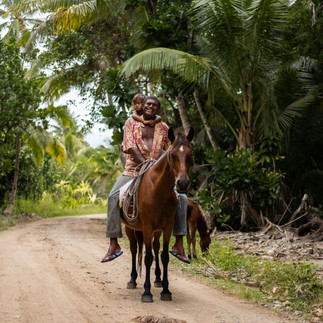Fiji’s Loloma Hour – The World’s First Happy Hour for the Environment
- Pru Goudie

- Jun 12, 2025
- 3 min read
by Pru Goudie
Fiji has a new first-of-its-kind initiative for 2025 - Loloma Hour - inviting visitors to spend an hour making a positive environmental, cultural, or community impact during their stay.

Dubbed ‘the world’s first happy hour for the environment,’ Loloma Hour embodies the Fijian spirit of Loloma: acting with generosity, driven by love. Whether planting coral, restoring mangroves, or engaging in cultural traditions, travellers can leave a positive mark on Fiji while experiencing its unique way of life.
A New Approach to Sustainable Travel
Tourism Fiji created the ‘Loloma Hour’ initiative as part of the country’s overarching sustainability goals that aim to preserve its natural beauty and cultural heritage by unifying and amplifying sustainability efforts across Fiji’s vital tourism industry. The goal in the first year is for Loloma hour to contribute at least 5,000 hours towards sustainability efforts across Fiji, ensuring meaningful impact for the ecosystems, coastlines and deeper engagement with local communities.
Coral Planting - Image Credit; Tourism Fiji
With travellers becoming more conscious of their environmental and social impact, Loloma Hour not only enhances Fiji’s appeal to eco-conscious travellers but also strengthens its reputation as a destination that prioritises cultural and environmental stewardship.
“True happiness comes not just from what you take, but what you give,” says Srishti Narayan, Chief Marketing Officer, Tourism Fiji.
“Loloma Hour gives visitors a chance to help preserve what makes Fiji so special—its people, environment, and traditions.”

How It Works
Visitors can take part in Loloma Hour through partnering resorts, hotels, and tour operators across Fiji, with activities spanning four key pillars:
Giving Back to Wildlife - Conservation walks, marine research, and species protection. Activities include: guided nature walks, manta ray or iguana conservation and planting the native trees that sustain them
Giving Back to the Community - Experience Fijian culture firsthand, whether it’s through traditional cooking classes, storytelling sessions, or village visits. These activities keep local traditions alive, support rural communities and create a deeper connection to Fiji’s stories, customs and way of life.
Village Life - Credit Image; Fiji Tourism
Giving Back to the Reef - Fiji’s coral reefs are among the most stunning in the world, but they are under threat from rising temperatures, overfishing and pollution. Reef activities include marine conservation efforts like coral planting, reef-safe snorkelling programmes, and marine habitat building.
Giving Back to the Coastline - Mangrove planting, tree restoration, and beach clean-ups to help safeguard Fiji’s coastline and the ecosystems that call it home.
Loloma Hour’s impact is already being tracked and since the programme launched this year in April 598 hours have been dedicated to reef, wildlife and coastline initiatives, with 600 corals and 100 mangroves being planted, plus 49.97 kilograms of waste collected from InterContinental Fiji’s “Litter for a Latte” campaign.

Participating Resorts
Leading resorts across Fiji are embracing Loloma Hour, offering guests an opportunity to take part in sustainability initiatives during their stay. These resorts and operators are committed to integrating Loloma Hour into their guest experiences, further strengthening Fiji’s leadership in sustainable tourism.
To learn about the participating hotels and find out more about Loloma Hour visit fiji.travel/loloma-hour
-ENDS-

Located in the heart of the South Pacific, Fiji is an adventurer’s paradise with 333 islands ripe for exploration. With crystal clear waters and shimmering coral reefs, Fiji offers some of the world’s best spots for snorkelling, diving and surfing. Beyond the beaches Fiji offers lush rainforests and rugged mountains with waterfalls, raft whitewater canyons, climb craggy peaks and remote village experiences.
See fiji.travel

















Comments